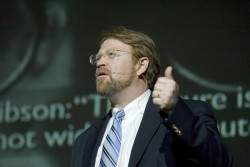 Erik Peterson speaks in the Drake Knapp Center. |
Approximately 1,900 people attended last week’s Bucksbaum Lecture
to hear futurist Erik Peterson discuss the coming “Seven
Revolutions.”
Peterson is senior vice president of the Center for Strategic and
International Studies , a nonpartisan Washington D.C.-based think-tank. Despite
his important work, he’s less well known than other Bucksbaum Lecturers such as
Bob Costas, Magic Johnson and Jane Goodall.
Advertisements, along with stories about Peterson in the Des
Moines Register and on Iowa Public Radio, helped raise awareness of Peterson’s
lecture.
“The Bucksbaum seems to have developed its own buzz, and
people are clearly trusting us that the speaker’s going to be good,” said
Drake President David Maxwell.
Peterson’s forecast for the future translates into one of
simultaneous “hyper-peril” and “hyper-promise.” During his
lecture last Wednesday, the implication was loud and clear: Today’s leaders
must be willing to adapt their strategies to survive in an ever-evolving world.
Peterson shared his view of the future in seven areas in which
global change is expected to be most revolutionary between now and the year
2025: technology, population, resource management, knowledge, economic
integration, conflict and governance.
The presentation outlined key global observations that hinted at
what is to come in the coming decades — for better or worse. Among Peterson’s
observations and projections:
* If the
current rate of growth continues, nearly 8 billion people will populate the
world in the year 2025 – compared to merely 1.5 billion people at the time of
Drake’s founding in 1881. And by the year 2050, there will be a higher number
of older people than younger people for the first time in history.
* By the
year 2025, water as an available resource will be discussed in much the same
way as oil is talked about currently. Likewise, the global demand for oil will
explode – by the year 2030, China will rival the United States in terms of
millions of barrels of oil imported daily.
* The
achievement of the completion of the Human Genome Project – which maps the
30,000 genes and sequences the three billion chemical base pairs that make up
the human genome – signals the expectation for increased scientific advances in
the areas of proteomics, genetics and germ-line therapy. With these new
advancements, children born now could feasibly live into the 22nd century.
* Due to
the near-instantaneous nature of media, Peterson asserted that the importance
now lies not in how we manage information, but how we judge it.
“Progressively, we choose our truth,” he said, which leads to an
environment of reduced decision times, more complex issues, polarized positions
and instant pressure.
* At the
current growth rate of aggregate output, the combined economic forces of
Brazil, Russia, India and China will overtake the G6 countries by the year
2040.
* A high
probability exists of an event involving weapons of mass destruction taking
place over the next 20 years.
* Some
37,000 nongovernmental organizations were registered in the year 2000, and
their impact is becoming increasingly influential in world affairs.

